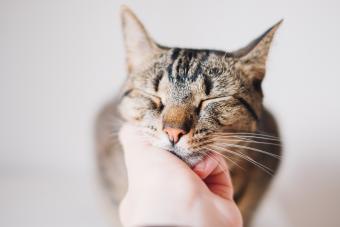
There's no denying cats can be fickle creatures. If you think your feline friend is upset with you, you might wonder how long cats can hold grudges. Fortunately, it's not long, but if you don't take steps to repair your bond, your cat could stay mad at you for a while. Discover whether cats hold grudges and how you can squash the beef (and yes, it might actually involve beef treats).
Do Cats Actually Hold Grudges?
Cats probably don't hold long-term grudges. Feline behavior experts say cats don't actually have the ability to do things with vengeful or malicious intent (even though their actions might tell a different story), which is the driving force behind grudges. That said, cats can remember negative experiences to some extent. In that sense, cats can hold grudges if they've been harmed.
Also, they may stay mad at you, but this isn't really a grudge, in that your cat isn't plotting against you. If a previous owner abandoned or abused a cat, they might recall that this person hurt them. So, if you stress your cat out or do something that they feel threatens them, they will remember you and possibly avoid you. However, giving your cat their breakfast 30 minutes late or sitting in their favorite chair won't inspire a grudge.
How Long Cats Hold Grudges
Even though they don't hold long-term grudges, cats can hold on to emotions like joy, sadness, or anger. So if you did something to upset your cat, they could definitely be mad at you. However, there's really no concrete evidence that shows how long a cat's short-term memory is. Some sources say it might be anywhere from 16 to 48 hours. That means your cat might stay mad at you for a couple of days, but then all will be forgiven. That is, unless you do something else to tick them off …
De-stressing tools like soothing feline pheromone sprays or calming treats can help relax your cat if they're particularly stressed out.
How Can I Tell If My Cat's Holding a Grudge?
It can be extremely hard to figure out what you may have done to annoy your cat. Felines are masters of mixed signals and are really sensitive to changes in their environment, so even small changes can set them off. It may be something you didn't even notice, like getting the scented version of their usual litter instead of the unscented, or it could be something more obvious, like you going away for the weekend. Most cats will exhibit one or more of these behaviors if they're annoyed:
- Swishing or flicking tail
- Ears back and flat
- Crouched position
- Staring directly at you
- Hiding
- Defecating or urinating outside the litter box
- Acting skittish
- Low meow, hiss, or growl
- Swatting at you
Tips to Deal With This Behavior
Approach dealing with a cat grudge with care because you don't want to irritate your feline friend even further. These tips can act as an "apology" to help your cat forgive you:
- Give your cat a little space to cool down. Make sure they have a comfortable and quiet area where no one will bother them so they can de-stress.
- Try to figure out why your cat is mad at you. This can be tricky, but pay attention to the environment and any changes you might notice. Did you just return from a trip? Does the litter box need cleaning? If you're able to resolve the source of the grudge, do so.
- Offer your cat gifts like treats or petting. This can help shift their negative experience to a positive one.
Apologize to Your Cat When They're Annoyed
Even though cats don't hold real long-term grudges, they can certainly become annoyed or angry with you. The good news is, these emotions generally subside within a day or two. However, you shouldn't just ignore your cat's behavior and assume it'll resolve. Try to "apologize" to your cat with slow blinks, affection, and de-stressing solutions to repair your bond.







